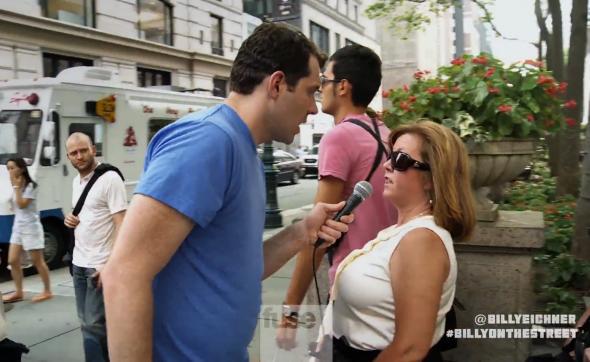In Billy on the Street, which airs Wednesday nights on Fuse, Billy Eichner runs around New York City, sometimes with a celebrity in tow, upbraiding random citizens. He is ostensibly doing this because he is the host of a “music and pop culture” game show, but Billy on the Street is really a long character piece starring Billy, an over-opinionated, shrieking, petulant asshole who also happens to be hilariously funny.
Billy on the Street features games like “Quizzed in the Face,” which has Eichner corner a stranger and bombard them with trivia questions, “Dead or Boring,” which is self-explanatory, and various celebrity-segments in which Billy sprints around the Flatiron Building with the likes of Amy Poehler or Debra Messing in tow and tries to get strangers to sing Christmas Carols or react to the phrase “It’s Debra Messing, you gays!” in appropriate fashion. Contestants who “win” are given, depending, a dollar, a toilet plunger, a stack of paper, or a bag of shampoo or conditioner. Contestants who lose get dismissed, heckled, or scoffed at by Billy, which is the equivalent of the audience winning.
The games are a framework, an excuse for Billy to approach strangers and misbehave all over them. Billy is an excitable, overgrown child with the interests of a pop-culture obsessed queen and the persnickety stubbornness of old age. Like a spoiled kid he thinks that he is the center of the universe and that his every opinion is gospel. He is ridiculously rigid, obsessed with rules, explaining the games as fast as he can, more times than he needs to—a combination that that makes him simultaneously condescending and borderline incoherent, like a kind of disturbed know-it-all. Much of the humor comes from his deranged excitement and abandon: In a sketch called “screamin’ tweets,” he gets strangers to scream out famous people’s tweets, but the funny part is how he yells “We’re screaming tweets!” over and over again, as if he’s about to keel over from a sugar high. In another, in which contestants answer a question about Tyler Perry, Billy just smashes pieces of art to bits.
Billy approaches strangers with complete and total impatience. He is aggravated from the start, but the joke is on the “contestant,” the person being treated poorly for the chance to win absolutely nothing, less often than you think. Sometimes the contestants are shown looking fairly idiotic—in one bit Billy asks a woman to name a woman, and then screams and yells at her until she is so flustered she fails to say even “me”—but the joke, most of the time, is Billy himself. Billy is not testing knowledge you should have, not asking about national security or math: He is asking, passionately, about whether Britney Spears or Christina Aguilera is hotter, what Lady Gaga should do next, how much a stack of plates costs, or if a song comes from the Black Eyed Peas or “the black guy who peed” (R. Kelly).
In the best recurring segment, the lightning round, Billy runs up to strangers (I haven’t counted, but the most underrepresented cohort on the show is straight white men, who may be the people least welcoming to a random jerk getting in their face) and offers to give them a dollar to answer various questions. He asks people to scream the name “Carol,” say “Twitter is a force,” hide, or to name three white people, but eventually he just starts running down the street screeching words into people’s faces: “Julianne Hough!” “Chris Tucker is back!” or, my very favorite, “It’s wedding bells for Julie Benz from Dexter!” with the sort of hysterical energy of someone begging for ice cream.
Billy may be an asshole—“oh, shut up!” he often sneers—but he is not, horror of horrors, too cool. In the celebrity segments, Billy is furious when people don’t know who the famous people are. He gets in fights about the talents of Jessica Alba—who he hates—and Meryl Streep—who he loves, almost losing it when a man opines that Glenn Close is better. For all of Billy’s flaws, he is willing at every moment to engage, to react, to overreact. In this way, he’s a caricature of a New Yorker, someone waiting for just a little opening to get overly familiar with you.
The show takes on a little additional energy when Billy finds a stranger who is not put off by his obnoxiousness, but takes it as a prompt to dish it back, to fight about Meryl Streep or claim that Denzel Washington appeared in Phantom of the Opera. One of the show’s only recurring guests is a middle-aged woman named Elena, who makes ethnographic jewelry, and whines that Billy is taking up her time, even as she stays to play games with him. She barely has email, but she knows a ton about pop culture, and is impervious to Billy’s hectoring, because she’s putting out her own unflappable, crazy vibe. As a New Yorker, I find something about the show very sweet: Even if you’re as difficult as Billy, you can find a kindred spirit if you run around the city long enough.
